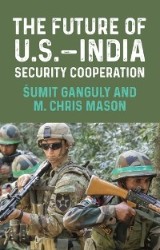Details

The future of U.S.-India security cooperation
|
32,99 € |
|
| Verlag: | Manchester University Press |
| Format: | EPUB |
| Veröffentl.: | 30.03.2021 |
| ISBN/EAN: | 9781526155139 |
| Sprache: | englisch |
| Anzahl Seiten: | 328 |
DRM-geschütztes eBook, Sie benötigen z.B. Adobe Digital Editions und eine Adobe ID zum Lesen.
Beschreibungen
<p>This book deals with the evolution, current status and potential of U.S.-India strategic cooperation. From very modest beginnings, the U.S.-India strategic partnership has developed significantly over the last decade. In considerable part, this growth has stemmed from overlapping concerns about the rise and assertiveness of the People’s Republic of China, as well as the instability of Pakistan. Despite the emergence of this partnership, significant differences remain, some of which stem from Cold War legacies, others from divergent global strategic interests and institutional design. <br><br>In spite of these areas of discord, the overall trajectory of the relationship appears promising. Increased cooperation and closer policy coordination underscore a deepening of the relationship, while fundamental differences in national approaches to strategic challenges demand flexibility and compromise in the future.</p>
This book provides an analytical overview of the state of the US-India strategic partnership from the U.S. and Indian perspectives.
<p>Introduction: An unnatural partnership? The future of U.S.–India strategic cooperation – Šumit Ganguly and M. Chris Mason<br><br>Part I Military-to-military cooperation<br><br>1 Less than meets the eye: a critical assessment of the military-to-military dimension of the U.S.–India security partnership – M. Chris Mason<br>2 Faltering friends: U.S.–India military cooperation in the twenty-first century – Abhijnan Rej<br><br>Part II Cybersecurity cooperation<br><br>3 U.S.–India relations on cybersecurity: an important moment for strategic action on collective cyberdefense – Jamil N. Jaffer<br>4 From intention to action: challenges in cyberdefense cooperation for the U.S. and India – Bedavyasa Mohanty<br><br>Part III Nuclear stability cooperation<br><br>5 Southern Asia in a decaying nuclear order: regional strategic dilemmas and U.S. policy approaches toward India – Frank O’Donnell<br>6 Enhancing nuclear stability in South Asia: the view from New Delhi – Rajesh Rajagopalan<br><br>Part IV Space cooperation<br><br>7 U.S.–India strategic partnership in space: a path toward cooperation – Victoria Samson<br>8 U.S.-India space cooperation: an Indian view – Rajeswari Pillai Rajagopalan<br><br>Part V Counterterrorism cooperation<br><br>9 The U.S.–India counterterrorism relationship: striking the balance – Tricia Bacon<br>10 Indo-U.S. counterterrorism cooperation: a bumpy road – Manoj Joshi<br><br>Part VI Intelligence cooperation<br><br>11 A vision for future U.S.–India intelligence cooperation – Carol V. Evans<br>12 Natural alliance: enhancing India–U.S. intelligence cooperation – Saikat Datta<br><br>Part VII Defense technology cooperation:<br><br>13 U.S.–India defense technology sharing and manufacturing: legacies of defense organizational processes – Frank O’Donnell<br>14 “Make in India”: a problem for bilateral defense technology cooperation – Pramit Pal Chaudhuri<br><br><i>Index</i></p>
<p>Sumit Ganguly is Rabindranath Tagore Chair in Indian Cultures and Civilizations and Professor of Political Science at the Indiana University, Bloomington<br><br>Chris Mason is Professor of National Security Affairs at the U.S. Army War College, Strategic Studies Institute</p>
<p>This book deals with the evolution, current status and potential of U.S.-India strategic cooperation. From very modest beginnings, the U.S.-India strategic partnership has developed significantly over the last decade. In considerable part, this growth has stemmed from overlapping concerns about the rise and assertiveness of the People’s Republic of China, as well as the instability of Pakistan. Despite the emergence of this partnership, significant differences remain, some of which stem from Cold War legacies, others from divergent global strategic interests and institutional design. <br><br>In spite of these areas of discord, the overall trajectory of the relationship appears promising. Increased cooperation and closer policy coordination underscore a deepening of the relationship, while fundamental differences in national approaches to strategic challenges demand flexibility and compromise in the future.</p>

















